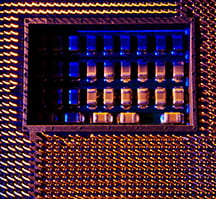ADVANCED COMPUTING SYSTEMS
The Advanced Computing Systems (ACS) research program drives innovation in advanced computing through research on complex computational systems, from hardware architecture to applications. ACS is located within the bwtech@UMBC Research and Technology Park adjacent to the University of Maryland-Baltimore County (UMBC) campus. ACS has active research projects in neuromorphic and probabilistic computing, advanced modeling and simulation, energy efficiency, architectures, productivity, and resilience. We collaborate extensively with industry, academia, and national labs.
COMPUTER ARCHITECTURE AND COMPUTER ENGINEERING
We research innovative architectures and technologies to advance high-performance computing (HPC) systems. The team works across the entire system design process to identify and nurture high-value technologies and architectures, create rapid development capabilities, and deliver advanced prototypes to support the needs of future computing systems.
PROBABILISTIC COMPUTING / RESILIENCE
High performance computing (HPC) systems are growing increasingly complex. The error rate of computation is growing and faults are becoming harder to diagnose and correct. Resilience develops methods to keep applications running to a correct solution in spite of errors. Probabilistic computing provides a mechanism to recover the correct solution even if there are incorrect intermediate results. Our resilience and probabilistic computing team researches methods of using non-determinism to solve problems faster and more efficiently by eliminating the need for traditional fault tolerance.
PRODUCTIVITY AND DATA ANALYTICS
The productivity and data analytics office researches new computer architecture and programming models for data intensive problems which are difficult to solve on modern but conventional computer systems. The focus includes high performance tensor-based knowledge discovery, streaming analytics, and run time system research.
.
MODELING, SIMULATION AND EMULATION
The development of technology and tools to model and simulate proposed computer architectures and examine emerging components is essential to the creation of high performance computing (HPC) systems that balances performance with power consumption, reliability and cost. Modeling, Simulation and Emulation researchers actively guide and cultivate a community of researchers creating such capabilities.
NEUROMORPHIC COMPUTING
The Neuromorphic Computation Research Program (NCRP) explores the benefits of neuromorphic computation for advanced machine learning frameworks and applyies them to national security missions. NCRP researches advanced hardware architectures to identify the most power-efficient methods of computing machine learning algorithms. Longer-term research includes identifying how the brain computes information to determine if these concepts can be incorporated into neuromorphic processor designs.
ENERGY EFFICIENCY
At almost all scales, from hand-held devices to large supercomputers, modern computing systems are power limited. The amount of computing that can be performed on a chip, in a cabinet, or in a room is limited by power dissipation. The energy efficient team studies technologies and architectures of high-performance computers to minimize power consumption while maximizing performance.






